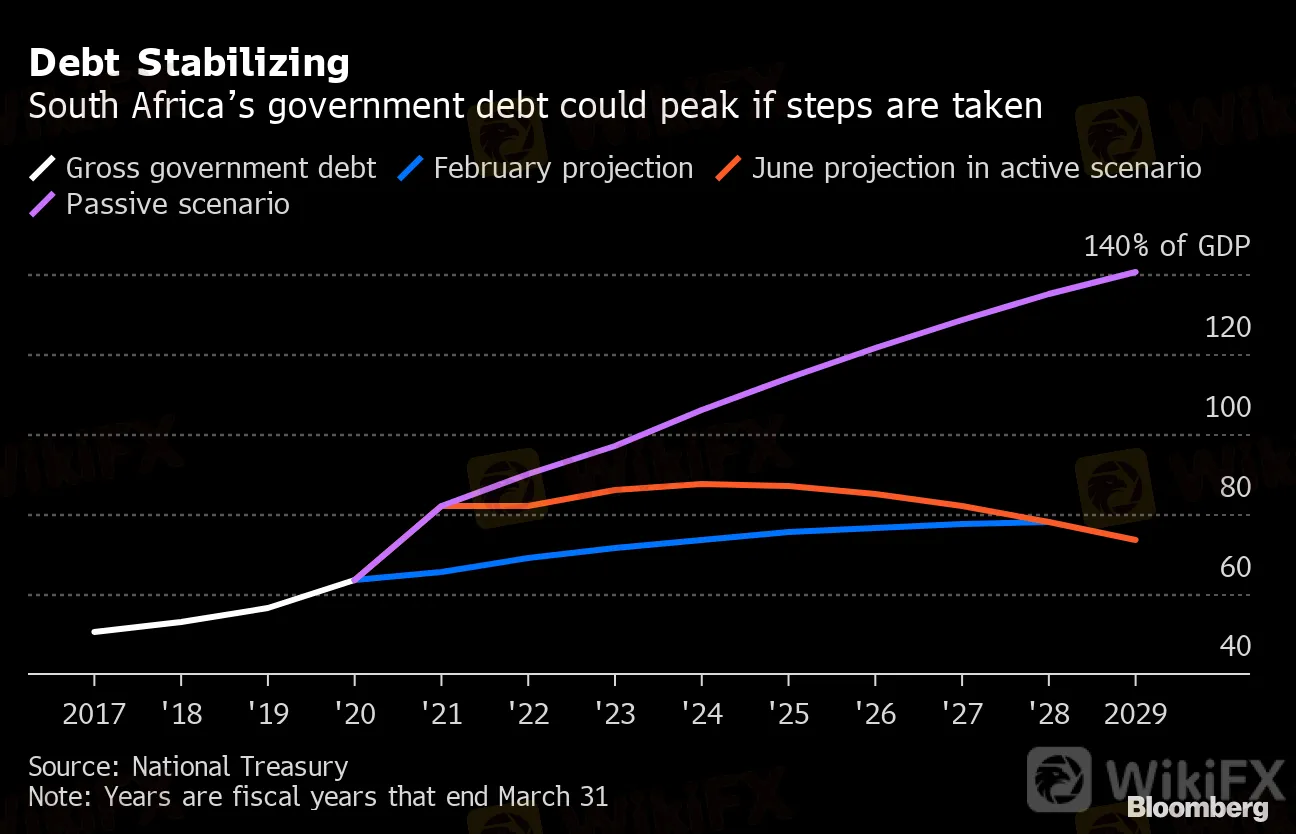简体中文
繁體中文
English
Pусский
日本語
ภาษาไทย
Tiếng Việt
Bahasa Indonesia
Español
हिन्दी
Filippiiniläinen
Français
Deutsch
Português
Türkçe
한국어
العربية
Charts That Show Troubles Presented in South Africas Budget
Abstract:South African Finance Minister Tito Mboweni has presented a special adjustment budget after the coronavirus pandemic and measures to curb its spread wreaked havoc on the economy and state finances.
South African Finance Minister Tito Mboweni has presented a special adjustment budget after the coronavirus pandemic and measures to curb its spread wreaked havoc on the economy and state finances.
While the supplementary budget documents released on Wednesday were only half of the more than 200 pages that are usually published in the main budget review, and lacked key forecasts beyond this year, there was enough to show the troubled state of the countrys economy.
The following charts show some of the numbers Mboweni presented to lawmakers.
Debt Stabilizing
South Africas government debt could peak if steps are taken
Source: National Treasury
Note: Years are fiscal years that end March 31

While the minister warned last week that the country could slump into a sovereign-debt crisis in four years, he said on Wednesday total debt could stabilize at 87.4% of gross domestic product by 2023-24 -- if the government takes active steps to manage its finances. Failing that, the debt trajectory will keep rising, topping 140% by the end of the decade.
“In the passive scenario, debt continues to rise, and debt-service costs outstrip spending on social and economic priorities,” the Treasury said in the review. “In the active scenario, government acts rapidly to stabilize debt by reducing spending and enacting economic reforms.”
Deficit Blowout
The coronavirus will push South Africa's budget gap over wartime levels
Source: Moody's Investors Service, South African Reserve Bank, S&P Global Ratings, Fitch Ratings, International Monetary Fund
Note: IMF forecast is for 2020 calendar year, others for fiscal year ending March 2021

One of the key numbers Mboweni presented was the updated forecast for the consolidated budget deficit. At 15.7% of GDP for 2020-21, the Treasury‘s projection is now more than double what it forecast in February and is bigger than most other recent estimates. The largest shortfall on record was 11.6% of GDP in 1914, followed by 10.4% in 1940. The document didn’t give the consolidated deficit for 2021-22 and beyond.
The Treasury now projects the economy will contract by 7.2% this year, even worse than during the Great Depression. That will add to inequality and unemployment, which surged to a 17-year high in the first quarter even before a lockdown that shuttered most businesses and led to massive job losses. The International Monetary Fund is even more pessimistic, cutting its forecast for a contraction to 8% from 5.8% in April.
“Borrowing more is not the solution, cutting more is not the solution,” Treasury Director-General Dondo Mogajane told reporters. “The solution lies in us growing the economy, ensuring that our growth agenda is enhanced. Thats the solution: growing, growing, growing the economy.”
More Support
South Africa's government is counting on $7 billion from multilaterals
Source: National Treasury
Note: Only the New Development Bank has approved funding yet

South Africa has softened its opposition to asking for help from institutions such as the IMF and World Bank and will now seek even more from these multilateral lenders than the $5 billion the Treasury initially said it would. The government intends to borrow $7 billion from international finance institutions to support the pandemic response, Mboweni said.
That includes $4.2 billion from the IMF. The lender‘s staff will make a submission about South Africa’s funding early in July and World Bank support is likely to follow approval of the IMF funding, he said.
— With assistance by Zoe Schneeweiss
(Updates with size and scope of deficit in paragraph below deficit chart)
Disclaimer:
The views in this article only represent the author's personal views, and do not constitute investment advice on this platform. This platform does not guarantee the accuracy, completeness and timeliness of the information in the article, and will not be liable for any loss caused by the use of or reliance on the information in the article.
WikiFX Broker
Latest News
AIMS Broker Review
The Hidden Checklist: Five Unconventional Steps to Vet Your Broker
Russia to Fully Ban Crypto Mining in 10 Regions Starting January 1, 2025
YAMARKETS' Jingle Bells Christmas Offer!
Why is there so much exposure against PrimeX Capital?
MTrading’s 2025 "Welcome Bonus" is Here
Doo Financial Obtains Licenses in BVI and Cayman Islands
CFI’s New Initiative Aims to Promote Transparency in Trading
Currency Calculator



